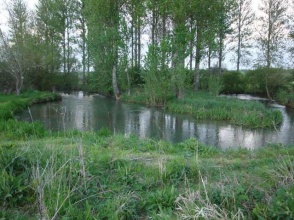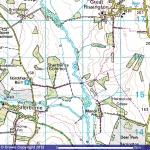Case study:Sherborne Windrush Restoration Project: Difference between revisions
No edit summary |
No edit summary |
||
| (26 intermediate revisions by 7 users not shown) | |||
| Line 1: | Line 1: | ||
{{Case study status | {{Case study status | ||
|Approval status= | |Approval status=Approved | ||
}} | |||
{{Location | |||
|Location=51.831110085109195, -1.7476844787597656 | |||
}} | }} | ||
{{Project overview | {{Project overview | ||
| | |Status=Complete | ||
| | |Themes=Habitat and biodiversity, Social benefits, Water quality | ||
|Country=England | |Country=England | ||
|Main contact forename=Vaughan | |Main contact forename=Vaughan | ||
|Main contact surname=Lewis | |Main contact surname=Lewis | ||
|Contact organisation=Cotswold Rivers Trust | |||
|Contact organisation url=www.cotswoldsriverstrust.org | |||
|Partner organisations=Cotswold Flyfishers, National Trust, Environment Agency, Defra, River Restoration Centre | |||
|Multi-site=No | |Multi-site=No | ||
|Project picture=River Windrush.JPG | |||
|Picture description=River Windrush | |||
|Project summary=The Sherborne Windrush Restoration Project is a partnership project that will use CRF funds to improve the River Windrush and the Sherborne Brook in the Sherborne area of Gloucestershire. | |||
The river suffers from a degraded habitat aris-ing from insensitive dredging which has removed river bed gravels and built up banks causing a disconnect from the water meadows as well as suppressing in stream habitat varia-tion. There are also problems caused by dif-fuse agricultural pollution and areas of over sharing. These issues are preventing this stretch of water from meeting the required standards under the Water Framework Directive (WFD). This project will build on the work already completed by addressing the following issues: inadequate levels of fish spawning gravels; lack of in-stream habitat variation; pollution from agricultural run off; poaching of the banks by cattle; lack of hydrological connectivity with the flood plain; over shading by streamside vegetation. | |||
}} | |||
{{Image gallery}} | |||
{{Case study image | |||
|File name=Map.JPG | |||
}} | |||
{{Image gallery end}} | |||
{{Toggle button}} | |||
{{Toggle content start}} | |||
{{Case study subcatchment | |||
|Subcatchment=Sherbourne Brook | |||
}} | }} | ||
{{Site | {{Site | ||
|Name=River Windrush | |Name=River Windrush | ||
|WFD water body code=GB106039030460 | |||
|WFD water body name=Sherbourne Brook | |||
|Reference morphology=Re-connection to the meadows | |Reference morphology=Re-connection to the meadows | ||
|Heavily modified water body=No | |Heavily modified water body=No | ||
| Line 20: | Line 42: | ||
|River corridor land use=Intensive agriculture (arable) | |River corridor land use=Intensive agriculture (arable) | ||
}} | }} | ||
{{Project background}} | {{Project background | ||
|Reach length directly affected=2000 | |||
|Project started=2012/08/01 | |||
|Project completed=2015/12/31 | |||
|Total cost category=100 - 500 k€ | |||
|Total1 cost=109.636 | |||
|Funding sources=Defra Catchment Restoration Fund, | |||
}} | |||
{{Motivations | {{Motivations | ||
|Hydromorphological quality elements= | |Hydromorphological quality elements=Continuity for organisms, Structure & condition of riparian/lake shore zones | ||
|Physico-chemical quality elements=Specific synthetic pollutants | |||
|Physico-chemical quality elements= | |Other motivation=Recreation, | ||
}} | }} | ||
{{Measures}} | {{Measures}} | ||
| Line 36: | Line 65: | ||
{{End table}} | {{End table}} | ||
{{Monitoring documents}} | {{Monitoring documents}} | ||
{{Case study monitoring documents | |||
|Monitoring document=TH004 monitoring framework table.docx | |||
|Description=RRC Monitoring table - Sherborne Windrush | |||
}} | |||
{{Monitoring documents end}} | {{Monitoring documents end}} | ||
{{Additional Documents}} | {{Additional Documents}} | ||
{{Case study documents | |||
|File name=Project Briefing Note Sherborne Windrush.pdf | |||
|Description=Sherborne Windrush Project Briefing Note | |||
}} | |||
{{Additional Documents end}} | {{Additional Documents end}} | ||
{{Additional links and references header}} | {{Additional links and references header}} | ||
{{Additional links and references footer}} | {{Additional links and references footer}} | ||
{{Supplementary Information}} | {{Supplementary Information}} | ||
{{Toggle content end}} | |||
Latest revision as of 12:18, 6 June 2017
Project overview
| Status | Complete |
|---|---|
| Project web site | |
| Themes | Habitat and biodiversity, Social benefits, Water quality |
| Country | England |
| Main contact forename | Vaughan |
| Main contact surname | Lewis |
| Main contact user ID | |
| Contact organisation | Cotswold Rivers Trust |
| Contact organisation web site | http://www.cotswoldsriverstrust.org |
| Partner organisations | Cotswold Flyfishers, National Trust, Environment Agency, Defra, River Restoration Centre |
| Parent multi-site project | |
| This is a parent project encompassing the following projects |
No |
Project summary
The Sherborne Windrush Restoration Project is a partnership project that will use CRF funds to improve the River Windrush and the Sherborne Brook in the Sherborne area of Gloucestershire.
The river suffers from a degraded habitat aris-ing from insensitive dredging which has removed river bed gravels and built up banks causing a disconnect from the water meadows as well as suppressing in stream habitat varia-tion. There are also problems caused by dif-fuse agricultural pollution and areas of over sharing. These issues are preventing this stretch of water from meeting the required standards under the Water Framework Directive (WFD). This project will build on the work already completed by addressing the following issues: inadequate levels of fish spawning gravels; lack of in-stream habitat variation; pollution from agricultural run off; poaching of the banks by cattle; lack of hydrological connectivity with the flood plain; over shading by streamside vegetation.
Monitoring surveys and results
Lessons learnt
Image gallery
|
Catchment and subcatchmentSelect a catchment/subcatchment
Catchment
Subcatchment
Site
Project background
Cost for project phases
Reasons for river restoration
Measures
MonitoringHydromorphological quality elements
Biological quality elements
Physico-chemical quality elements
Any other monitoring, e.g. social, economic
Monitoring documents
Additional documents and videos
Additional links and references
Supplementary InformationEdit Supplementary Information
| ||||||||||||||||||||||||||||||||||||||||||||||||||||||||||||||||||||||||||||||||||||||||||||||||||||||||||||||||||||||||||||||||||||||||||||||||||||||||||||||||||||||||||||||||||||||||||||||


